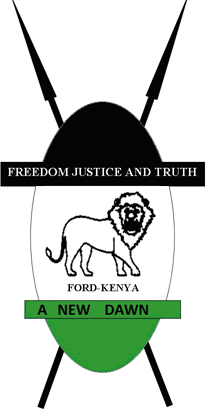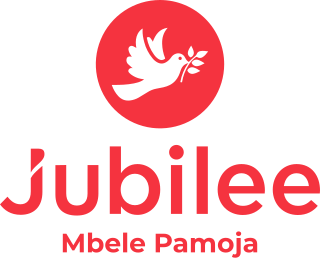
The politics of Kenya take place in a framework of a presidential republic, whereby the president is both head of state and head of government, and of a multi-party system in accordance with a new constitution passed in 2010.

The Kenya African National Union (KANU) is a Kenyan political party that ruled for nearly 40 years after Kenya's independence from British colonial rule in 1963 until its electoral loss in 2002. It was known as Kenya African Union (KAU) from 1944 but due to pressure from the colonial government, KAU changed its name to Kenya African Study Union (KASU) mainly because all political parties were banned in 1939 following the start of the Second World War. In 1946 KASU rebranded itself into KAU following the resignation of Harry Thuku as president due to internal differences between the moderates who wanted peaceful negotiations and the militants who wanted to use force, the latter forming the Aanake a forty, which later became the Mau Mau. His post was then occupied by James Gichuru, who stepped down for Jomo Kenyatta in 1947 as president of KAU. The KAU was banned by the colonial government from 1952 to 1960. It was re-established by James Gichuru in 1960 and renamed KANU on 14 May 1960 after a merger with Tom Mboya's Kenya Independence Movement.

Uhuru Muigai Kenyatta is a Kenyan politician who served as the fourth president of Kenya from 2013 to 2022. Kenyatta is the son of Jomo Kenyatta, Kenya's first president, and his fourth wife Mama Ngina Kenyatta. He has been married to Margaret Gakuo Kenyatta since 1991. They have three children: the two sons, Jomo and Muhoho, and a daughter, Ngina Kenyatta.

The United National Independence Party (UNIP) is a political party in Zambia. It governed the country from 1964 to 1991 under the socialist presidency of Kenneth Kaunda, and was the sole legal party in the country between 1973 and 1990. On 4 April 2021, Bishop Trevor Mwamba was elected President of UNIP.

Elections in Benin take place within the framework of a multi-party democracy and a presidential system. Both the President and the National Assembly are directly elected by voters, with elections organised by the Autonomous National Electoral Commission (CENA).

Elections in Kenya take place within the framework of a multi-party democracy and a presidential system. The President, Senate and National Assembly are directly elected by voters, with elections organised by the Independent Electoral and Boundaries Commission (IEBC).

Forum for the Restoration of Democracy–Kenya (FORD–Kenya) is a Kenyan political party. The party has sat in the government of Kenya once, under the National Rainbow Coalition, from 2003 to 2007, having ended forty years of one party rule. In April 2022, the party joined the Kenya Kwanza coalition for the August 2022 elections, and is headed by Moses Wetangula, the current speaker of the National Assembly of Kenya. The party tends to be more popular among the Luhya people.
Raphael Tuju, EGH is a Kenyan politician. In 2002—after a career as a journalist, TV producer, and real estate investor—Tuju was elected to the parliament from where he continued to mould his political career to date.

Moses Francis Shoga Masika Wetang'ula, is the current Speaker of the National Assembly of Kenya, as well as leader of the FORD-Kenya, arguably the most popular political party after ODM in Western Kenya. He served in the government of Kenya as Minister for Foreign Affairs from 2008 to 2010 and from 2011 to 2012, and he was Minister for Trade from 2012 to 2013.

Peter Kenneth is a Kenyan politician. He hails from Kirwara Sub-location of Gatanga Constituency in Murang'a County, Kenya.
The United Democratic Movement (UDM) is a political party that was founded in 1999 by politicians who were at the time considederd to be renegades from the then ruling party Kenya African National Union but was denied registration by the then head of state Daniel Toroitich Arap Moi and most of its then leaders went to other parties by the time of the 2002 general elections.

General elections were held in Kenya on 4 March 2013. Voters elected the President, members of the National Assembly and newly formed Senate. They were the first elections held under the new constitution, which was approved in a 2010 referendum, and were also the first run by the new Independent Electoral and Boundaries Commission (IEBC). They coincided with the 2013 Kenyan local elections.
Kenya National Congress (KNC) is a Kenyan political party founded in 1991 during the early days of the return of Multiparty Democracy as a result of a split in FORD-Asili. It has consistently fielded candidates in general elections since 1992 at Parliamentary and Local Authority levels. The party sponsored Gatanga Member of Parliament Peter Kenneth, who launched his presidential bid on the party ticket, as well as an alliance between him and Raphael Tuju of the Party of Action The stated vision of KNC, as according to its official web site, is to see Kenya as a proud and prosperous nation that takes care of all her citizens and where hope and self-confidence thrives among all Kenyans both at home and abroad.
The New Forum for the Restoration of Democracy–Kenya, commonly known as New Ford Kenya was a political party in Kenya.

The National Alliance (TNA) was a political party in Kenya. It took on its current identity when Uhuru Kenyatta assumed control and renamed it as the vehicle for his 2012 presidential campaign.

General elections were held in Kenya on 8 August 2017 to elect the President, members of the National Assembly and Senate. They coincided with the 2017 Kenyan local elections which elected Governors and representatives in the devolved governments.

The Jubilee Party of Kenya is a major political party in Kenya. It was the country's ruling party from 2016 to 13 September 2022. The party was founded on 8 September 2016, following the merger of 11 smaller parties. During the 2017 election, the Jubilee Party secured a plurality of seats in Parliament and the party leader, Uhuru Kenyatta, was re-elected president.

The Amani National Congress (ANC) is a social-liberal political party in Kenya. It tends to be more popular among the Luhya people.

The 2018 Kenya handshake was a political truce made on 9 March 2018 between Kenyan President Uhuru Kenyatta and former Kenyan Prime Minister Raila Odinga. The two had been the leaders of opposing political factions amidst widespread political violence and civil unrest; they had previously faced one another in the contested 2017 Kenyan general election. Under the agreement, their political feud with an agreement that Kenyatta would support Odinga in the upcoming presidential elections. Consequently, the Azimio coalition was formed, Uhuru became its chairman, and Odinga became the presidential candidate with Martha Karua as his running mate. They lost to William Ruto, who was then Kenyatta's deputy. They challenged Ruto's victory in the Supreme Court, but Chief Justice Martha Koome said his claims did not meet the evidentiary threshold and dismissed the case. At a March 2023 protest in Nairobi they demanded an audit of the IEBC election servers.

The Building Bridges Initiative (BBI) was a proposed set of amendments to the Constitution of Kenya initially proposed in October 2019. In the wake of the 2017 general election annulment and subsequent re-run, incumbent President Uhuru Kenyatta mandated the formation of the Presidential Taskforce on Building Bridges to Unity Advisory on 31 May 2018. The Taskforce was assigned to provide constitutional and legislative solutions in 9 broad categories:
- Lack of National Ethos
- Ethnic Antagonism and Competition
- Responsibilities and Rights
- Shared Prosperity
- Divisive Elections
- Safety and Security
- Devolution
- Corruption
- Inclusivity











